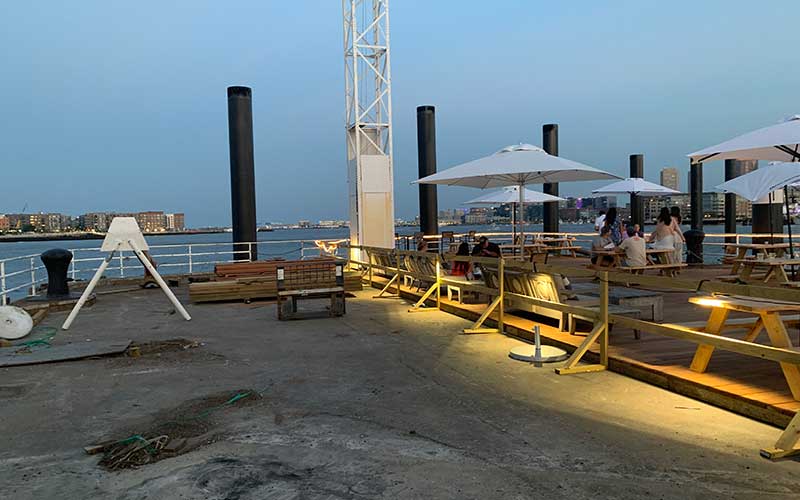
We must continue to find ways to promote public health and the economy by allowing restaurants to seat diners outdoors. But we also must protect the public’s right to access open space along the city’s waterfront.
Last summer, as the COVID-19 pandemic raged, restaurants threw open their doors and set up tables outdoors in an effort to keep their businesses going. On Boston’s waterfront, that often meant expanding private dining into public open space, including the Harborwalk.
Now, with life expected to slowly return to some semblance of normal by the summer, we must continue to find ways to promote public health and the economy. But we also must protect the public’s right to access open space along the city’s waterfront. The COVID-19 crisis forced businesses to encroach on public spaces by necessity – as that crisis abates, it should not become an excuse to continue such encroachment moving forward.
At the same time, other public spaces on the waterfront – restrooms, community meeting spaces, and other public accommodations – must re-open as required by state law. We cannot allow the pandemic to open a loophole in state law that allows temporary public safety measures to become permanent fixtures that exclude people from Boston’s increasingly exclusive waterfront.
Public Waterfront Access is a Right
The Harborwalk is a 40-mile pedestrian pathway that follows the Boston shoreline. The Harborwalk, along with the public open spaces alongside it, are regulated under the Massachusetts Public Waterfront Act (also known as Chapter 91).
When outdoor dining became a lifeline for many restaurants last year, those located along the city’s waterfront had few options for where their outdoor tables could go. They had to encroach on public open space or risk not serving customers at all.
This summer, we expect open-air dining will continue to be a critical option for restaurants to maintain economic viability, as customers may still be reluctant to crowd into indoor spaces. But businesses should look for ways to activate underused spaces like alleys, streets, and parking lots for their outdoor seating – not the Harborwalk or highly used waterfront parks and open spaces. In circumstances where businesses must encroach on public open space, we must make sure it remains a temporary fix.
Last year, CLF, along with Boston Harbor Now, sent a letter to the Massachusetts Department of Environmental Protection with recommendations that will help balance the need to protect open space while also allowing for safe, open air dining. These include:
- To quality for flexibility in their outdoor seating, property owners should be in good standing with the state on their Chapter 91 license requirements (for example, providing the required public benefits).
- The Harborwalk should never be fully blocked either by tables or lines of people waiting for service.
- Any outdoor seating should be temporary and moveable – and open to the public free of charge.
- Before encroaching on the Harborwalk, restaurants should look first at underused spaces as options, including alleys, parking lots, street parking spaces, and roads.
The good news is that, since then, the City of Boston has taken action, requiring applicants for an outdoor dining permit to disclose whether the waterfront property is regulated under Chapter 91 and whether they have notified and gotten permission from DEP to expand into protected spaces. This will be helpful in coordinating the permit process, but still requires guidance from DEP on when, how, and for how long encroachment into these areas will be permitted.
Holding Owners Accountable for Public Accommodations
An additional challenge on Boston’s waterfront this spring and summer will be ensuring that required “facilities of public accommodation” (spaces that are open to the public like bathrooms, ticketing kiosks, meeting spaces, and more) are reopened as soon as it becomes safe to do so. We must hold waterfront property owners accountable so that they don’t use the COVID-19 pandemic as an excuse for keeping these amenities closed to the public.
Last summer, hundreds of Bostonians and other Massachusetts residents rediscovered Boston’s waterfront as they sought respite from homebound days during COVID-19. It is even more critical this season that we protect our public open spaces, amenities, and waterfront access from private encroachment.
We must strike a public-private balance on the waterfront and we cannot allow the COVID-19 pandemic to open a loophole that allows waterfront property owners to reduce public access to the waterfront.
Know Your Rights
Massachusetts state law gives you the right to access and enjoy the harbor and other waterfront areas in the state. CLF has put together the People’s Guide to the Public Waterfront Act, and now is a good time to brush up on your rights. And, if you see examples of encroachment on the Harborwalk that you think infringe on your rights to public access, please make sure to contact us at e-info@clf.org or the Department of Environmental Protection at dep.waterways@state.ma.us



